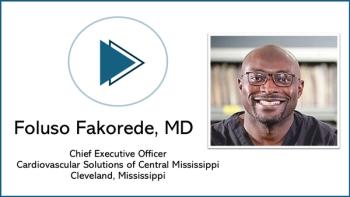
Rates of amputation in Black Americans with peripheral arterial disease are 3-times higher than that of their White counterparts. Dr Fakorede, discusses, here.

Rates of amputation in Black Americans with peripheral arterial disease are 3-times higher than that of their White counterparts. Dr Fakorede, discusses, here.

ACP 2025: Dr Fakorede outlines PAD risk amplifiers, polyvascular disease connections, and when to screen using ABI, TBI, or exercise testing in high-risk patients.

ACP 2025: Foluso Fakorede, MD, discusses the importance of recognizing and screening for peripheral artery disease in primary care.

Expert insights on PAD prevention, boosting colon cancer screening, and expanding obesity treatment options.
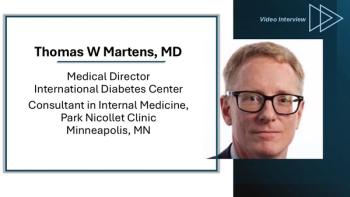
CGM is now standard of care in T1D and evidence is solid for a role in insulin-treated T2D; Thomas Martens, MD, shares thoughts on CGM growth in the next 3-5 years.

Martens, medical director of the International Diabetes Center (IDC) in Minneapolis, highlights an IDC resource that helps target problem areas in management of hyperglycemia.

Martens, Director of the International Diabetes Center, in Minneapolis, highlights the differences between the 2 methods and what the research has found on each.


ACP 2025: Dr Kalager shares strategies for addressing patient beliefs, presenting risk data, and promoting shared decision-making in primary care settings.
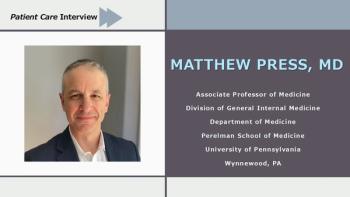
ACP 2025: Collaborative care can help address the mental health crisis, but payment and EHR challenges remain. Matthew Press, MD, explains how primary care can overcome these barriers and why integration is essential.

ACP 2025. The timely glucose data available with continuous glucose monitoring is what's needed for optimal daily diabetes control, says Tom Martens, MD.

The mildly elevated glycemia of prediabetes is a pathological condition with serious risks for those 77 million, says endocrinologist Samuel Dagogo-Jack, MD, DSc.

ACP 2025: Matthew Press, MD, shares actionable steps for primary care physicians to adopt a collaborative care model, including how to start small and partner with other practices.
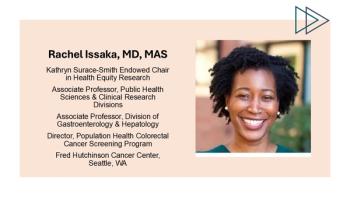
Issaka, from the Fred Hutch Cancer Center, said insurance coverage, a patient's resources, and social determinants of health all factor in the choice.
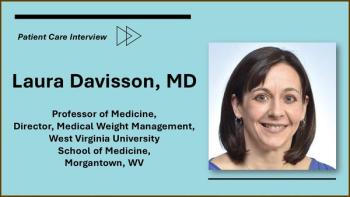
ACP 2025: GLP-1 medications are advancing obesity care, but lifestyle changes and bariatric surgery remain key components. Laura Davisson, MD, discusses how to personalize treatment strategies.

ACP 2025: Dr Press discusses how the Penn Integrated Care model equips primary care physicians to manage mental health conditions more effectively while reducing burnout.

ACP 2025: Rachel Issaka, MD, MAS, reviewed data from a Kaiser Permanente program that narrowed racial and ethnic disparities in CRC screening compliance and related deaths.
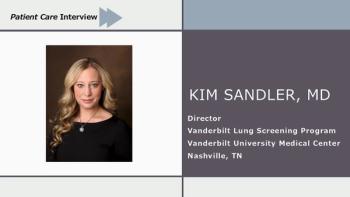
ACP 2025: Lung cancer is rising among nonsmokers, especially women. Kim Sandler, MD, discusses future screening challenges, research insights, and the need to expand screening eligibility.

ACP 2025: Discover how the collaborative care model supports mental health in primary care through team-based care, symptom tracking, and psychiatric consultation—boosting outcomes and reducing burden on clinicians.

ACP 2025. A focused CRC prevention program begins with primary care where support and advocacy for regular screening begins, Issaka stressed.

ACP 2025: Issaka, from the Fred Hutchinson Cancer Center, told internists that three-quarters of CRC deaths can be attributed to 3 types of screening failure.

ACP 2025: Kim Sandler, MD, outlines key strategies to boost lung cancer screening uptake in primary care.
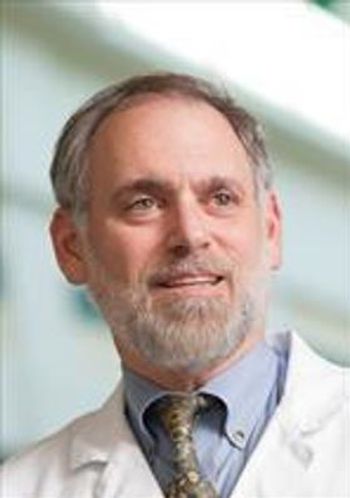
ACP 2025. The director of the UCSF Headache Center built an evidence-based framework for diagnosing and treating headache disorders seen in primary care.

ACP 2025: Laura Davisson, MD, outlines how PCPs can navigate GLP-1 medication coverage issues and why to consider recent cash-pay options.

ACP 2025: Dr Press explains how primary care clinicians can implement the collaborative care model to integrate mental health services, improve outcomes, and navigate reimbursement.

ACP 2025. Karol E Watson, MD, PhD, highlighted how traditional approaches to CV care have poorly addressed the unique presentations, risk factors, and pathophysiology of heart disease in women.

ACP 2025. Harvard gerontologist and preventive cardiologist Ariela Orkaby, MD, MPH, highlighted the many nuances required in the cardiovascular care of the aging population.

ACP 2025: Kim Sandler, MD, explains how primary care physicians can use shared decision-making to guide patients through lung cancer screening, emphasizing risk, benefit, follow-up, and smoking cessation.

ACP 2025: Kim Sandler, MD, sat down with Patient Care to discuss the benefits of lung cancer screening, citing a 20% reduction in lung cancer mortality with annual screenings.

ACP 2025. Scripps Clinic's John M Kelso, MD, offered topline updates on all types of allergies including a step-by-step on how to "delabel" patients identified as penicillin-allergic.